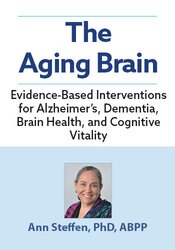

Changes in brain health can be scary.
Clients worry about memory lapses, mental fog, and losing their independence. These fears can quickly spiral into anxiety, uncertainty, and even hopelessness, leaving them feeling stuck and powerless.
As a clinician, you know the challenge isn’t just calming their fears - it’s giving them the tools they need to protect their cognitive health and thrive as they age.
In this one-day live, interactive webinar, you’ll learn exactly how to help your clients flip the script on aging.
With evidence-based strategies, With evidence-based strategies, you’ll help clients move from fear to informed engagement, building confidence in their ability to maintain cognitive health and thrive as they age.
You’ll walk away from this training able to:
After this training, you’ll leave with a roadmap to empower your clients, position yourself as a trusted source of knowledge in brain health, and create real, lasting change for your clients.
Reserve your spot today!
Planning Committee Disclosure - No relevant relationships
All members of the 小蝌蚪视频. planning committee have provided disclosures of financial relationships with ineligible organizations and any relevant non-financial relationships prior to planning content for this activity. None of the committee members had relevant financial relationships with ineligible companies or other potentially biasing relationships to disclose to learners. For speaker disclosures, please see the faculty biography.
Continuing education credit information is coming soon for this non-interactive self-study package.
CE hours may be available for select professions, as listed in the target audience. Hours will be dependent on the actual recording time. Please check with your state licensing board or organization for specific requirements.
There may be an additional fee for CE certificates. Please contact our Customer Service at 1-800-844-8260 for more details.
**Materials that are included in this course may include interventions and modalities that are beyond the authorized practice of your profession. As a licensed professional, you are responsible for reviewing the scope of practice, including activities that are defined in law as beyond the boundaries of practice in accordance with and in compliance with your professions standards.
Ann Steffen, PhD, ABPP, When it comes to supporting brain health and cognitive vitality in aging clients, Dr. Ann Steffen is the expert you want to learn from. With over 30 years of experience, she has trained thousands of health professionals, combining cutting-edge research with practical, real-world strategies that you can apply immediately.
Dr. Steffen’s extensive background includes a PhD in clinical psychology from Indiana University-Bloomington, advanced training in interdisciplinary geriatric care at the VA Palo Alto Health Care System, and a postdoctoral fellowship in clinical Geropsychology at Stanford University School of Medicine.
Currently, Dr. Steffen is a professor of psychology at the University of Missouri-St. Louis, where she has shaped the next generation of clinicians as the director of Gerontology programs and clinical training for the university’s APA-approved doctoral program in clinical psychology. As a faculty clinician at UM-St. Louis Community Psychological Service, she continues to provide hands-on expertise in supporting aging clients and their families.
Dr. Steffen holds dual board certifications in Behavioral & Cognitive Psychology and Geropsychology by the American Board of Professional Psychology (ABPP), a testament to her unmatched credentials. She is also the lead author of Treating Later Life Depression: A Cognitive Behavioral Approach, a go-to resource for clinicians from Oxford University Press’ Treatments That Work Series.
When you attend this course, you’ll learn directly from a nationally recognized leader who combines research-backed insights with practical strategies to help you transform the way you support your clients. Dr. Steffen’s proven expertise will leave you equipped to address cognitive concerns, empower aging clients, and enhance outcomes in your practice.
Speaker Disclosures:
Financial: Ann Steffen has an employment relationship with the University of Missouri-St. Louis and receives royalties as a published author. She receives a speaking honorarium with TZKSeminars, Inc. and 小蝌蚪视频. She has no relevant financial relationships with ineligible organizations.
Non-financial: Ann Steffen is an Ad hoc reviewer for several peer review journals, for a complete list contact 小蝌蚪视频. She is a member of the Alzheimer's Association.
Visit our FAQ page at www.pesi.com/faq or contact us at www.pesi.com/info
Access never expires for this product.
Satisfaction Guarantee
Your satisfaction is our goal and our guarantee. Concerns should be addressed to: PO Box 1000, Eau Claire, WI 54702-1000 or call 1-800-844-8260.
ADA Needs
We would be happy to accommodate your ADA needs; please call our Customer Service Department for more information at 1-800-844-8260.
小蝌蚪视频 Mobile App
Access CE trainings on your phone or tablet through our free mobile app. Choose video or audio-only versions of online courses from the world’s best instructors, and complete your CE requirements anywhere, anytime, at your own pace.
Please wait ...